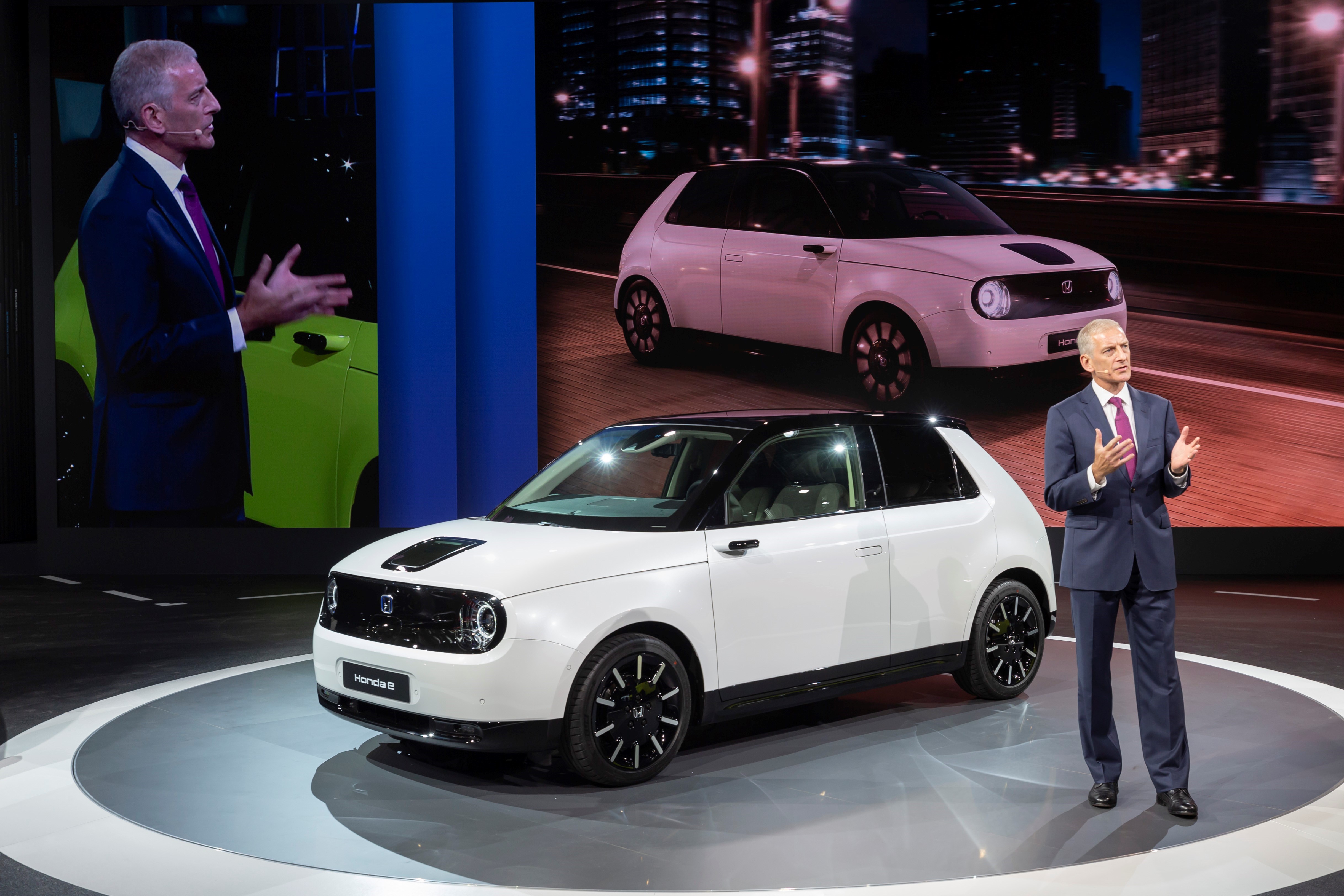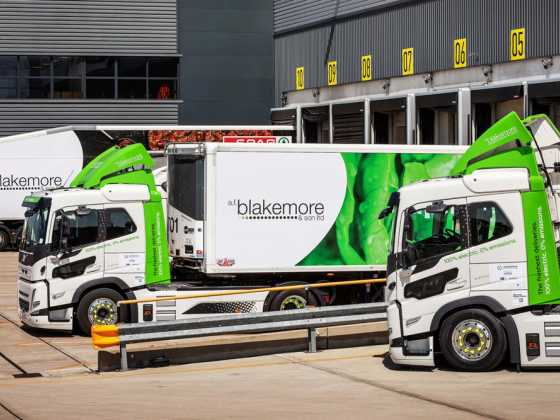Frankfurt's battery-powered debuts

The show floor at the Frankfurt Motor show was packed with a range of electric cars – from tech-filled futuristic concepts to every day cars and vans. GreenFleet rounds up the battery-powered vehicles coming our way
Hyundai 45
Hyundai unveiled its electric vehicle concept, named 45, which puts a futuristic twist on a 45-year-old Hyundai Pony Coupe Concept.
The car’s name also owes itself in part to the 45-degree angles at the front and rear, forming a diamond-shaped silhouette.
Cleverly, you can see how much range the battery has from LED lights from the bottom of the door.
45 also has technological developments that may be a hint to future Hyundai models, such as a hidden Camera Monitoring System (CMS).
The car utilises side cameras instead of traditional wing mirrors to overcome visibility challenges caused by dirt gathering on the mirror offering progressively less visibility. This is done by an embedded turntable module, which rotates the lens past a brush to ensure perfect visibility at all times.
LECV Van
The new light commercial vehicle from London EV Company (LEVC) has made its European debut in Frankfurt.
Based on the same architecture and range extender technology as LEVC’s TX Taxi, this second vehicle from LEVC has an electric range of 80 miles and a combined petrol and EV range of 377 miles.
LEVC’s LCV is not just targeting last mile deliveries, but ‘distribution to door’ – providing the link between out of town depots and city centres, capable of collecting goods outside of a major city in range extender mode, before switching to EV mode in an urban ultra-low emissions zone.
Full details of the LCV will be revealed closer to its official launch in 2020.
LEVC has tested the new van to the world’s highest durability standards, adapting its million-mile TaxiDur test for the new light commercial vehicle.
The vehicle will have the latest active safety systems, along with the world’s highest crash safety standards. It will be better for drivers too, benchmarked against premium MPVs on comfort and ergonomics with a cabin designed around the needs of the van driver (and passenger). In addition to this, the LCV will feature the class-leading turning circle synonymous with the iconic black cab.
Honda e
Honda is aiming to electrify all of its European car sales by 2025 and at the Frankfurt Motor Show, visitors were able to see the first production-ready Honda e - which combines retro, futuristic and playful looks.
The Honda e is equipped with a high-power electric motor available with two power outputs of 100 kW (136ps) or 113kW (154ps), and has torque of 315Nm. The 35.5kWh battery delivers a range of up to 136 miles from a single charge. The Honda e will reach 0-62mph in approximately 8 seconds.
A fast-charging capability also allows recharge to 80 per cent capacity in 30 minutes.
The Honda Personal Assistant is activated by saying, “OK Honda”, followed by the question or instruction. Machine learning enables the technology to develop a greater understanding of an individuals’ voice over time, in order to deliver more accurate responses.
The Honda e is also accessible using a digital key, allowing the car to be locked and unlocked using only the smartphone application.
Customers can make a reservation for priority ordering online in UK, Germany, France and Norway, or register their interest in other European markets on Honda national websites. It will be priced from £26,160.
Honda also announced that its next Jazz, which will be launched in 2020, will only have a hybrid powertrain.
Mercedes EQV
Mercedes Benz revealed its electric EQV multi-purpose vehicle, which was seen in concept form at the Geneva Motor Show this year.
With a range of 252 miles on a single charge, the manufacturer calculates that the EQV has an energy consumption figure of 27 kWh/100km, and can charge from 10 per cent to 80 per cent in less than an hour.
Expected to prove a rival for the likes of the Tesla Model X in the domestic market, the EQV is also a zero-tailpipe emission option for taxi, private hire, and shuttle fleets.
Vauxhall Corsa-e
The electric Vauxhall Corsa, which is already available for pre-orders, had its premiere at the Frankfurt Motor Show.
Known as the Corsa-e, the vehicle's 50kWh battery has a range of 205 miles (WLTP).
Using a public fast-charger, the Corsa-e can be charged to 80 per cent of its capacity in just 30 minutes.
Priced from £26,490, including the Government’s £3,500 Plug-in Car Grant, the Corsa-e will be available in two highly-specified trims, both of which will come as standard with a 7-inch touch screen, 11kWh on-board charger, satellite navigation, LED headlights, alloy wheels, rear parking sensors and DAB radio.
On Personal Contract Purchase (PCP), the Corsa-e will start at £270 per month for 47 months, with a customer deposit of £5,549.40 and an optional final payment of £9,123.00*, based on an SE model with optional Orange Fizz paint (£650).
The Corsa-e’s battery warranty guarantees that at least 70 per cent of its capacity is maintained for 100,000 miles, or eight years.
CUPRA Tavascan Concept
Seat-owned sports' brand CUPRA unveiled its Tavascan Concept in Frankfurt. The all-electric coupe SUV is the first road CUPRA to use a 100 per cent electric powertrain. A 77kWh lithium-ion battery pack provides a range of up to 280 miles.
The Tavascan Concept is powered by two motors – one integrated on the front axle, the second at the rear – providing a combined 306PS to all four wheels. This provides the car with a 0-60mph time of less than 6.5 seconds.
Volkswagen ID.3
Volkswagen's first model from the new fully electric ID. family, ID.3, had its world premiere at the Frankfurt Motor Show.
Set to rival the Tesla Model 3, the ID.3 has three different battery sizes available; a large battery (77 kWh net2), a medium-sized battery (58 kWh net) and a small battery (45 kWh net). Depending on the battery size selected, a range of between 205 and 341 miles (as per WLTP) is possible.
The ID.3 is based on the new modular electric drive matrix (MEB), which has been specifically designed for electric drive use, ensuring the largest possible vehicle interior.
Volkswagen will also guarantee the capacity of the ID. batteries for eight years or 160,000 kilometres.






